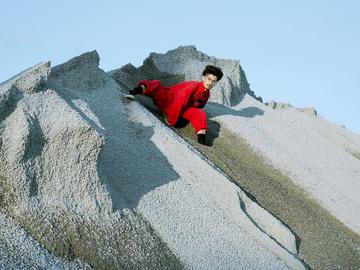Having made field recordings in the Amazon jungle, Susobrino has continued to update his music with his Bolivian roots. He is now presenting his new EP Pocualeíto. “It was as if my cradle was waiting for me. I just had to open the right door.”
© Ivan Put
Also read: Susobrino trok naar Latijns-Amerika: 'Ik kwam blut terug maar als mens ben ik veel rijker'
Who is Susobrino?
- Born in Sucre, Bolivia, raised in Arendonk, Belgium
- Studied at the PXL-Music college in Hasselt
- Debut EP Mapajo (2018) fuses electronica with traditional instruments and field recordings from the Amazon
- Won the Champion Sound Beat Battle (in 2018 and 2019) and Elektropedia Awards for most promising artist (2018) and best remix (2020)
- Refined his palette in 2019 with the EP Seis Estudios para Guitarra and the album La Hoja de Eucalipto
- Moved to Brussels in early March 2020 – just before the lockdown – where he runs the collective Noannaos with fellow producers Ashley Morgan and Pippin
He was born as Bart Van Obbergen Pérez, but since he started releasing music he prefers to be called by his pseudonym Susobrino (“your cousin” in Spanish) or simply Suso. “It's closer to how I feel, and to my Bolivian roots,” he says in a basement studio at the See U site in Elsene/Ixelles, where the cultural centre Pilar provided him and his friends from the collective Noannaos (if you say it a few times in a row you'll hear “no one knows”) with a residency spot. Here he has housed part of his collection of vintage flutes, percussion and Afro-Latin instruments. “I'm someone who keeps track of everything, even the silliest little piece of paper. But certainly instruments I would never throw away, even if they are a bit broken. To me, there's a soul in them.”
In Brussels I found what I was missing. When I meet up with others here, there’s always someone creative around the table
“Mixing acoustic instruments and field recordings with electronics with the music software Ableton was my cocktail from the beginning,” the musician, producer and deejay explains the main pillar of his creative process. “Even though the field recordings on Pocualeíto are no longer the main focus, I'm still very proud of my roots. When I was younger, I didn't do much with my past because I didn't know how to express it. But later, when I discovered percussion music and started jamming with friends, they showed me the way. My roots feel like a higher energy. Discovering them through my music is like a mission. It was as if my cradle was waiting for me. I just had to open the right door.”
Two months after Susobrino was born in his mother's Bolivia, the family moved to his father's Belgium. In the rural village of Arendonk in the Campine region, his artistic awakening took a long time, however. “It was a rural community. The youth listened exclusively to hardstyle and thought it was cool to drink a lot of beer and then puke it up again. You see perhaps that I didn't really feel at home in that macho world.”
The gates of the world really opened up for this somewhat timid boy, who had already cautiously begun experimenting with electronic music, when he started studying music at the college PXL in Hasselt at the age of eighteen. Almost immediately he met the young producers Ashley Morgan and Pepijn Leenders alias Pippin, two like-minded souls who are still his best friends and with whom he runs the collective Noannaos. “Coming from Arendonk, Limburg was a revelation. People there were more open and friendly. But still, apart from my fellow students the people I met did not want to stray far from the church tower, while I was looking for cultural connections. After working in catering at Ikea for three months, I knew the entire lives of my colleagues, including their personal dramas, even though I didn't really care about that at all.”
A frog choir
In particular, it was the suggestion of his teacher and mentor at PXL, producer and musician Micha Volders, that would broaden his world view. “I was making mostly techno and house at the time, but wanted to do something with my roots for my final dissertation. I had suggested to Micha to visit the Bolivian community in Brussels – at that time I could not dream further. But he asked me why I didn't just go to Bolivia! Before that, I had only been there with my parents.”
The four-week solo trip would have a lasting impact on his life and music. He visited his hometown Sucre, the capital La Paz and Oruro, where the traditional carnival procession took place, but he also took his recording equipment into the Amazon jungle. “A blissful time. In the morning, I would be woken up by the howler monkeys, in the evening the crickets would chirp and during the day I might record a frog choir and make underwater recordings in the jungle from a boat. With my vintage cassette recorder I imagined myself like Indiana Jones. At first I didn't realise why everyone sleeps with the light on. Until one evening when I was whistling by a river and the dogs started barking, probably because there were jaguars around. I've changed since that trip. I feel like I've gotten closer to myself.”
Eucalyptus addiction
The result of his journey can be heard on the EP Mapajo, which also became his PXL final work, but also on later releases. “For example, I made 'Killay' – which means 'moon' in Quechua and can be heard on Pocualeíto – here in Brussels. It contains flute and percussion recordings I made in a nature reserve in La Paz from an instrumentalist who you also hear talking at the end of the track.” The new EP combines older music Susobrino recorded in Hasselt with new music he made in his new hometown Brussels, where he arrived just before the lockdown.
“Here I found what I was missing in Hasselt. When I meet up with others, there's always someone creative around the table. Because Pilar also offered me a studio straight away, I was able to make a very good start, despite Covid, also with the collective with whom we want to organise events. These might be listening sessions, but also the occasional party, as long as they are based on the community. Dengue Dengue Dengue will also be present at the release show in the Beursschouwburg. The Peruvian producers, who can be heard on the new track 'Wasos' and also served as a sounding board, run the label Kebrada Records on which Pocualeíto appears. “It may not be the biggest label, but since they operate out of Berlin and are pretty much the pioneers of my music niche, I consider it a big step forward.”
“Pocualeíto” is deliberately a (quasi) anagram of “Eucalipto”. “My great uncle, my (Belgian) father's uncle, planted a lot of eucalyptus trees during his stay in Bolivia, as did friends of mine, and I think the leaves are very beautiful,” he enthuses as he pulls out a small box of Mentisan and lets us smell the imported eucalyptus ointment. “I use it every day. The smell alone drives me crazy. It is also a real panacea. It not only helps against dry lips, but also if you have a cold, rheumatism, muscle pain, burns or a hangover. Feel free to call eucalyptus my spirit animal. Or addiction.” (Laughs)
SUSOBRINO
Pocualeíto release show: 28/10, 20.00, Beursschouwburg, www.beursschouwburg.be



